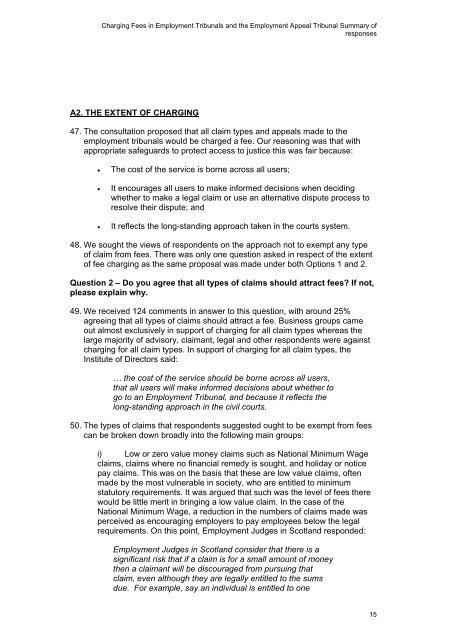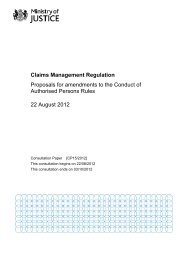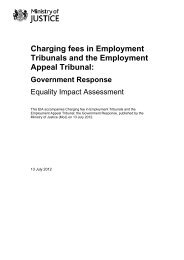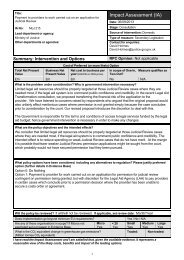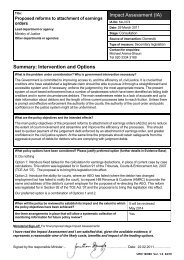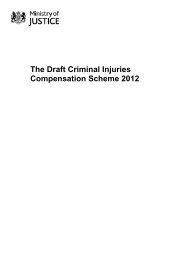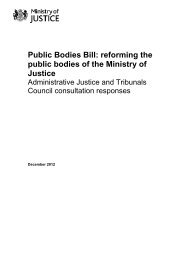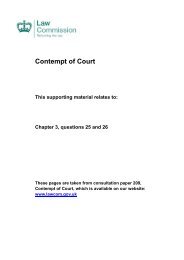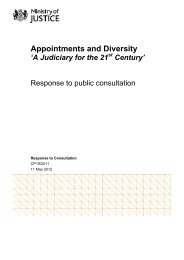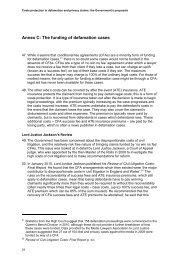Charging Fees in Employment Tribunals and the ... - Ministry of Justice
Charging Fees in Employment Tribunals and the ... - Ministry of Justice
Charging Fees in Employment Tribunals and the ... - Ministry of Justice
You also want an ePaper? Increase the reach of your titles
YUMPU automatically turns print PDFs into web optimized ePapers that Google loves.
<strong>Charg<strong>in</strong>g</strong> <strong>Fees</strong> <strong>in</strong> <strong>Employment</strong> <strong>Tribunals</strong> <strong>and</strong> <strong>the</strong> <strong>Employment</strong> Appeal Tribunal Summary <strong>of</strong>responsesA2. THE EXTENT OF CHARGING47. The consultation proposed that all claim types <strong>and</strong> appeals made to <strong>the</strong>employment tribunals would be charged a fee. Our reason<strong>in</strong>g was that withappropriate safeguards to protect access to justice this was fair because:The cost <strong>of</strong> <strong>the</strong> service is borne across all users;It encourages all users to make <strong>in</strong>formed decisions when decid<strong>in</strong>gwhe<strong>the</strong>r to make a legal claim or use an alternative dispute process toresolve <strong>the</strong>ir dispute; <strong>and</strong>It reflects <strong>the</strong> long-st<strong>and</strong><strong>in</strong>g approach taken <strong>in</strong> <strong>the</strong> courts system.48. We sought <strong>the</strong> views <strong>of</strong> respondents on <strong>the</strong> approach not to exempt any type<strong>of</strong> claim from fees. There was only one question asked <strong>in</strong> respect <strong>of</strong> <strong>the</strong> extent<strong>of</strong> fee charg<strong>in</strong>g as <strong>the</strong> same proposal was made under both Options 1 <strong>and</strong> 2.Question 2 – Do you agree that all types <strong>of</strong> claims should attract fees? If not,please expla<strong>in</strong> why.49. We received 124 comments <strong>in</strong> answer to this question, with around 25%agree<strong>in</strong>g that all types <strong>of</strong> claims should attract a fee. Bus<strong>in</strong>ess groups cameout almost exclusively <strong>in</strong> support <strong>of</strong> charg<strong>in</strong>g for all claim types whereas <strong>the</strong>large majority <strong>of</strong> advisory, claimant, legal <strong>and</strong> o<strong>the</strong>r respondents were aga<strong>in</strong>stcharg<strong>in</strong>g for all claim types. In support <strong>of</strong> charg<strong>in</strong>g for all claim types, <strong>the</strong>Institute <strong>of</strong> Directors said:… <strong>the</strong> cost <strong>of</strong> <strong>the</strong> service should be borne across all users,that all users will make <strong>in</strong>formed decisions about whe<strong>the</strong>r togo to an <strong>Employment</strong> Tribunal, <strong>and</strong> because it reflects <strong>the</strong>long-st<strong>and</strong><strong>in</strong>g approach <strong>in</strong> <strong>the</strong> civil courts.50. The types <strong>of</strong> claims that respondents suggested ought to be exempt from feescan be broken down broadly <strong>in</strong>to <strong>the</strong> follow<strong>in</strong>g ma<strong>in</strong> groups:i) Low or zero value money claims such as National M<strong>in</strong>imum Wageclaims, claims where no f<strong>in</strong>ancial remedy is sought, <strong>and</strong> holiday or noticepay claims. This was on <strong>the</strong> basis that <strong>the</strong>se are low value claims, <strong>of</strong>tenmade by <strong>the</strong> most vulnerable <strong>in</strong> society, who are entitled to m<strong>in</strong>imumstatutory requirements. It was argued that such was <strong>the</strong> level <strong>of</strong> fees <strong>the</strong>rewould be little merit <strong>in</strong> br<strong>in</strong>g<strong>in</strong>g a low value claim. In <strong>the</strong> case <strong>of</strong> <strong>the</strong>National M<strong>in</strong>imum Wage, a reduction <strong>in</strong> <strong>the</strong> numbers <strong>of</strong> claims made wasperceived as encourag<strong>in</strong>g employers to pay employees below <strong>the</strong> legalrequirements. On this po<strong>in</strong>t, <strong>Employment</strong> Judges <strong>in</strong> Scotl<strong>and</strong> responded:<strong>Employment</strong> Judges <strong>in</strong> Scotl<strong>and</strong> consider that <strong>the</strong>re is asignificant risk that if a claim is for a small amount <strong>of</strong> money<strong>the</strong>n a claimant will be discouraged from pursu<strong>in</strong>g thatclaim, even although <strong>the</strong>y are legally entitled to <strong>the</strong> sumsdue. For example, say an <strong>in</strong>dividual is entitled to one15


